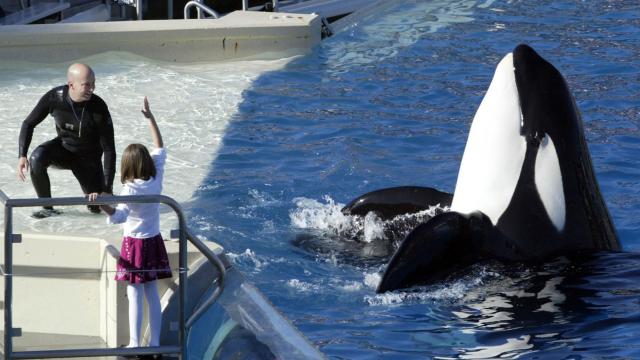Diseases and premature deaths among confined orcas are linked to the tremendous stresses endured by these aquatic mammals as a result of their captivity, according to new research.
That orcas don’t do well in captivity is hardly a secret. These cetaceans often die from infections brought on by their weakened immune systems, which happens despite constant veterinary care and life in controlled environments.
At the same time, captive orcas often display unusual stress-related behaviours, such as self-mutilation, listlessness, and agitation.
New research published in the Journal of Veterinary Behaviour suggests these and other health issues can be traced to a single, fundamental cause: chronic stress.
“When orcas die in marine parks and aquariums the response by the facilities is often one of being confounded or stunned,” Lori Marino, the lead author of the study and a biologist at the Whale Sanctuary Project, told Gizmodo.
“The message is sent that there is no connection between living in concrete tanks and mortality. But this paper and others before it show that this is far from the case. We should not be surprised when a young orca dies in a tank. We know why—it is not a mystery. It is explainable by well-known mechanisms of how chronic stress affects health.”
For the new study, an interdisciplinary team of experts gathered and reviewed current scientific literature pertaining to the health and welfare of captive orcas.
In turn, this literature was studied in the context of the documented effects of chronic stress on mammals, which is known to detrimentally affect an animal’s immune system. Marino said her team “drew on this literature and brought it all together to provide a coherent picture of what is going on with captive orcas.”
In total, the team cited five interrelated factors as contributing to the captive orcas’ chronic stress.
The first is their confinement and the fact that tanks at aquariums and theme parks aren’t deep or wide enough to meet their needs. These large aquatic mammals can’t move and swim as they’d like, leading to odd, often repetitive behaviours.
Second, orcas are constantly bombarded by unwanted and unusual sensory disturbances, especially those of an acoustic nature. Typical noises endured by orcas include fireworks, noise from an audience, construction, and sounds from filtration systems. The concrete tanks themselves also contribute to a less-than-ideal acoustic environment.
The third factor involves social stresses, and how orcas aren’t able to forge normal relationships given the constant disruptions—especially disruptions that prevent proper bonding between mother and calf, which results in poor maternal care.
Fourth, orcas have virtually no control over their lives, leading to learned helplessness. This manifests as depression, a lack of motivation, learning deficits, eating disorders, and a compromised immune system.
Finally, there’s the intense boredom. These highly intelligent and emotional mammals lack sufficient stimulus, resulting in depression, listlessness, irritability, and anxiety.
Taken together, the researchers say it’s no wonder these animals are almost constantly sick and have abbreviated lifespans.
One might argue that intelligence in orcas serves as a buffer for the stresses of living and performing in concrete tanks, but Marino said her team’s findings revealed the opposite.
“Orcas and other cetaceans are actually more vulnerable to stress in entertainment parks because of their cognitive complexity,” she told Gizmodo. “Cognitive complexity means that one’s needs are also complex and those needs are impossible to meet in such artificial settings.
Chronic boredom is one of the most potent causes of chronic stress and ill-health. Because of their intellectual and emotional capacities, cetaceans are highly susceptible to the adverse effects of chronic boredom in captivity.”
The argument that captive orcas have it better than free-ranging orcas also falls flat, she said.
“These animals evolved over millions of years to travel far and wide and to meet the challenges of finding food and avoiding risks,” she said. “When they are not allowed to do this in marine parks they suffer for it. They are adapted to the kinds of stressors found in a natural setting. They are completely unadapted, physiologically and psychologically, to deal with the kinds of stressors they meet in marine parks.”
Marino stressed that the purpose of new paper wasn’t to attack marine parks and aquariums, but rather, “to endorse a scientific and empirical approach to captive orca welfare,” she said. Orcas, “like many other highly intelligent, large, wide-ranging, and socially complex animals, cannot thrive in a concrete tank or cage,” said Marino.
Kerry Bowman, a bioethicist at the University of Toronto, liked the new paper, telling Gizmodo it’s a “solid scientific inquiry” that serves to strengthen ethical arguments against keeping orcas in marine parks and aquariums.
“This paper clearly identifies the range and scope of the harms orcas face in captivity and eliminates any lingering question of orca captivity as being ethically justifiable,” said Bowman, who wasn’t involved with the new work.
The scathing 2013 documentary Blackfish brought the plight of captive orcas to the world’s attention, prompting changes in the industry.
SeaWorld stopped its breeding program in 2016, but its orcas are still required to perform in shows.
And earlier this month, Canada passed its so-called “Free Willy” bill, which will make it illegal to possess cetaceans for entertainment purposes, though the bill doesn’t protect dolphins or whales currently living in the country’s aquatic parks.
